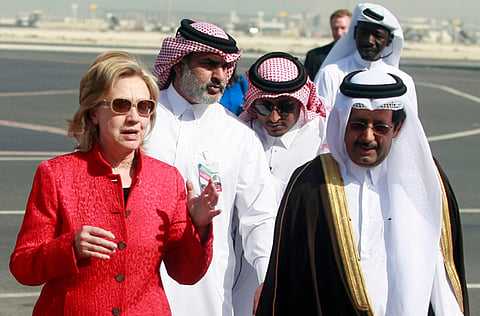Iran becoming military dictatorship, says Hillary Clinton
Revolutionary Guard Corps supplanting the government, Clinton says in Doha

Doha: US Secretary of State Hillary Rodham Clinton said on Monday that Iran is becoming a military dictatorship.
Speaking to Arab students at Carnegie Mellon's Doha campus, Clinton said Iran's Revolutionary Guard Corps appears to have gained so much power that it effectively is supplanting the government.
"Iran is moving toward a military dictatorship," she said. "That is our view."
Last week the US Treasury Department announced that it was freezing the assets in US jurisdictions of a Revolutionary Guard general and four subsidiaries of a previously penalized construction firm he runs because of their alleged involvement in producing and spreading weapons of mass destruction.
The Revolutionary Guard has long been a pillar of Iran's regime as a force separate from the ordinary armed forces.
The Guard now has a hand in every critical area including missile development, oil resources, dam building, road construction, telecommunications and nuclear technology.
It also has absorbed the paramilitary Basij as a full-fledged part of its command structure; giving the militia greater funding and a stronger presence in Iran's internal politics.
In her Doha appearance, Clinton also said she foresees a possible breakthrough soon in stalled peace talks between Israel and the Palestinians.
"I'm hopeful that this year will see the commencement of serious negotiations that will cover every issue that is outstanding," she said, adding that "everyone is anticipating" progress after more than a year of impasse between the negotiating parties.
The peace talks broke down in late 2008 with Israel's incursion into Gaza, which had launched rocket attacks on Israeli targets.
Clinton spoke in an interview with the Al Jazeera TV network before a live audience of mostly Arab students at Carnegie Mellon's Doha campus.
In remarks in the Qatari capital on Sunday, Clinton said she and the president are disappointed that the administration's efforts to restart Israeli-Palestinian peace talks had failed thus far.
A Carnegie Mellon audience member who identified himself as an Iranian expatriate asked Clinton if the US would be present in Iraq if Iraq had no oil resources.
She said the US wants a normal relationship with the Iraqi government, regardless of its natural resources.
"When we leave Iraq, as has been agreed to, with our military and we're on schedule to do that we will hopefully have a relationship with Iraq as we have with any other country," she said. On Sunday she said the number of U.S. troops in Iraq had fallen this month below 100,000 and that the United States is on track to have all combat troops out of the country by the end of summer.
Reflecting the extent of concern in the Arabian Gulf region about a US confrontation with Iran, another member of the audience asked Clinton about the outlook for improving relations with Tehran.
Clinton reiterated the Obama's administration view that Iran has violated its international obligation to use nuclear technology only for peaceful purposes. And she regretted that Iran has not accepted US offers of nuclear negotiations.
"Unfortunately, there has not been the kind of response that we had hope for from the Iranian leadership," she said.
Clinton makes a point of raising the topic of women and girls' rights whenever she travels abroad. In a speech Sunday to a forum on US-Muslim relations, she stressed it in the context of US support for nations seeking to build democratic institutions.
"As nations strive to build and strengthen governments that reflect the will of their people, grounded in their own traditions, they can count on the United States to be their partner," she said. "But the will of the people means the will of all the people, men and women. Women's rights are an issue of singular importance to me personally and as secretary of state."
She also cited the issue of violence against women, without mentioning any specific country.
"Even today, in 2010, women are still targets of violence," she said Sunday. "And all too often, religion might be used to justify it. But there is never a justification for violence against women. It is not cultural. It is criminal. And it is up to religious leaders to take a stand for women, to call for an end to honor killings, child marriages, domestic and gender-based violence."
Later Monday, Clinton was flying to Riyadh, Saudi Arabia, for a meeting with King Abdullah and a session with Saudi Foreign Minister Prince Saud Al Faisal.
Sign up for the Daily Briefing
Get the latest news and updates straight to your inbox



